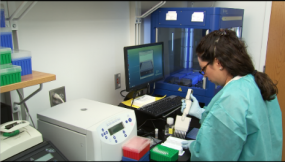What's New
DLS is Collaborating with Partners on Curriculum for a Global Laboratory Fellowship

The World Health Organization (WHO) published a DLS co-authored article identifying gaps in laboratory leadership and the need for structured fellowships and curriculum to build skills in the global setting. The 2013-2016 Ebola outbreak identified the need to build functional and sustainable laboratory infrastructures and the Center for Global Health (CGH) Global Health Security Agenda prioritized strengthening national laboratory systems as an important goal. The article highlights the CDC Laboratory Leadership Service and use of competency-based training and curriculum based on CDC and Association of Public Health Laboratories Laboratory Competency Guidelines to build necessary leadership skills.
DLS-developed CDC Recommendations Supported in Genetic Counselor Study

The study, published in the American Journal of Medical Genetics, highlighted the CDC recommendations from the 2009 MMWR, Good Laboratory Practices for Molecular Genetic Testing for Heritable Diseases and Conditions, which was spearheaded by DLS to improve the quality of genetic testing in health care. The study suggests that implementing good laboratory practice recommendations by providing laboratory assistance to clients in test selection and result interpretation reduced pre- and post-analytical errors. The authors conclude that approximately 26% of all test orders for complex genetic tests were changed (modified or canceled), and ARUP Laboratories’ clients saved $1.2 million dollars over 21 months.
DLS-Funded Study Highlighted in Article on Physician Order Entry Automated Alerts for Pap Tests
A DLS supported and coauthored study was cited in a University of California-Davis article as providing evidence base that computerized physician order entry (CPOE) could be a method to address impediments to provider compliance with laboratory practice guidelines. The UC Davis study suggests that interruptive alerts within CPOE systems improve compliance of Pap test ordering, thereby avoiding unnecessary follow-up tests that could be potentially harmful and costly to patients.
LMBP Systematic Review Cited by Internationally Renowned Authors
A Laboratory Medicine Best Practices (LMBP) systematic review was recently cited in a July 2017 article on critical results management by internationally renowned authors at the Padua University School of Medicine in Italy. As part of a larger LMBP initiative to identify effective laboratory medicine practices associated with improved healthcare quality outcomes, the 2012 systematic review describes how using an automated notification system leads to faster reporting of randomly selected critical results in approximately 61.8% of cases, compared to randomly selected manually reported critical values. These findings are recognized as helping to avoid communication failures in clinical care with direct patient safety consequences.
Guardians of Public Health: DLS Supports our Laboratory Heroes

Photo caption: (L-R): Ami Putman, Associate Director for Communication for CDC’s Division of Laboratory Systems; Patricia M. Simone, Acting CDC Chief of Staff; Anne Schuchat, CDC Principal Deputy Director; Molly Kellum, Education Program Specialist in the Division of Scientific Education and Professional Development.
DLS attended a CDC Georgia Open House to help create opportunities for dialogue between CDC and Georgia policy, business, and community representatives. Check out more ways we support our laboratory heroes!
- Page last reviewed: July 27, 2017
- Page last updated: August 30, 2017
- Content source:


 ShareCompartir
ShareCompartir